Your cart is empty.


Your cart is empty.
This material is designed and intended to provide general information in summary form on legal topics, current at the time of publication, for general informational purposes only. This is not legal advice.
This webinar gives people seeking asylum, refugees and new migrants an overview of basic workplace rights in Australia, such as how to find out how much you should be paid, your rights to paid breaks, and your rights to ask questions or seek advice if you feel your boss is doing the wrong thing.
It was presented on 15 December 2022 at the Red Cross Migrant Support Program, Adelaide, with participants online and in person. The recording has been edited to protect participants’ confidentiality. Information was current as of that date.
Please note that this is general information and may not be relevant to your particular matter. This should not be taken as legal advice.
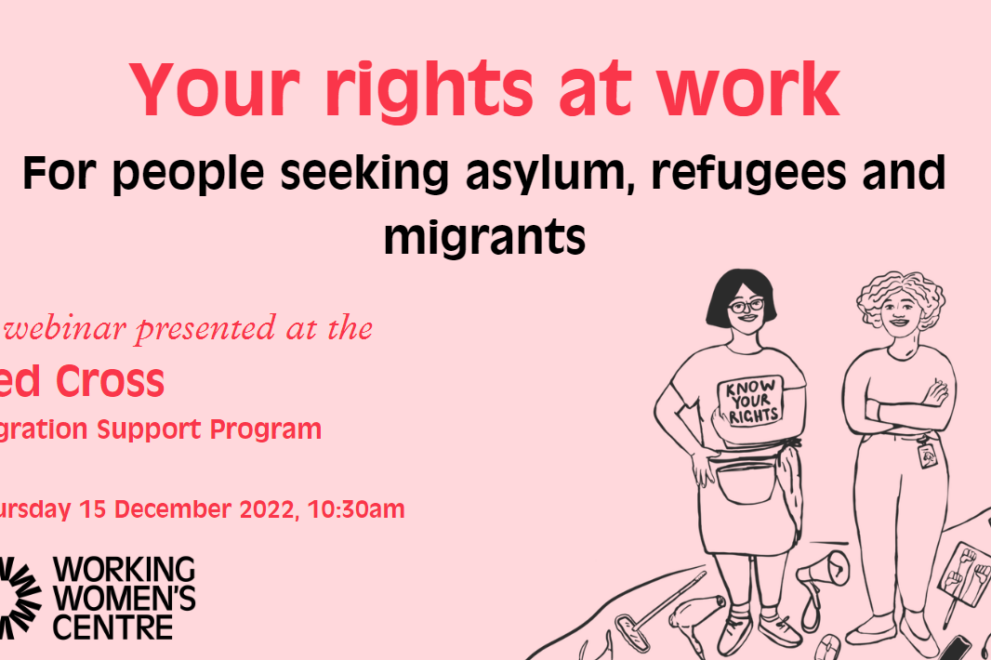
This material is designed and intended to provide general information in summary form on legal topics, current at the time of publication, for general informational purposes only. This is not legal advice.
Presented with Jamie Bucirde from Not So Hospitable
In this webinar we discuss the problem of sexual harassment in the hospitality industry, and your rights and legal options if it happens to you.
We discuss problematic normalised behaviours, and what a healthy and safe workplace looks like. We also cover the latest developments in the law, such as the upcoming legislative changes that will place a positive obligation on employers to prevent staff from being sexually harassed.
This webinar was presented on 7 November 2022. Information was current as of that date.
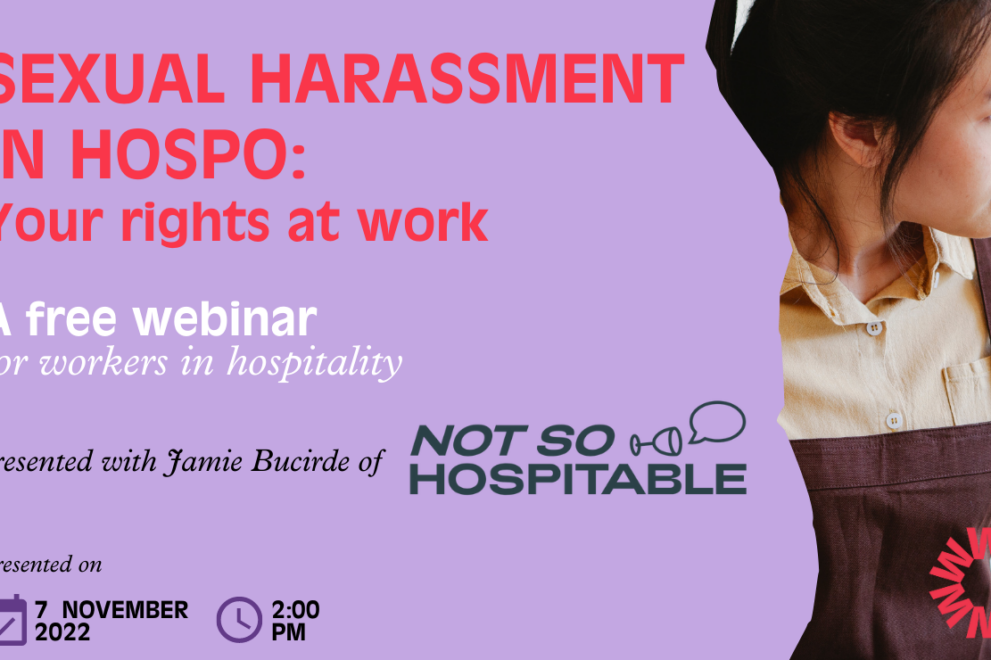
This material is designed and intended to provide general information in summary form on legal topics, current at the time of publication, for general informational purposes only. This is not legal advice.
In this webinar we discuss your fundamental legal rights and protections at work. We cover common issues encountered by LGBTIQA+ employees, how to deal with discrimination or bullying, and your right to a safe workplace.
We also discuss some new initiatives such as gender affirmation leave, and how you can create change at your workplace.
This webinar was presented on 24 November 2022 as part of Adelaide’s Feast Festival. Information was current as of that date.
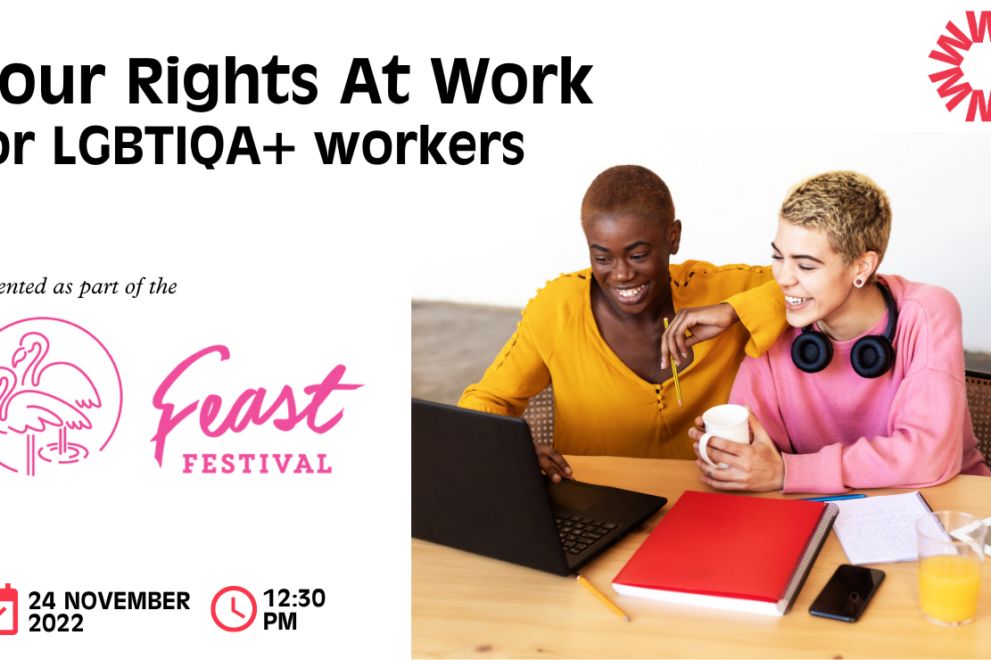
This webinar was presented as part of our 2022 Small Business Webinar Series.
Our Small Business Webinar series was designed around common issues identified by our lawyers in 2022, as a series of bite-sized, easy-to-understand educational sessions to help busy small businesses understand their obligations to their workers.
In this webinar, one of our lawyers, Kylie Porter, along with Jamie Bucirde from Not So Hospitable, discuss your obligations to your workers to prevent and address sexual harassment, and how to create positive culture change in your business.
We discuss problematic normalised behaviours and factors that make a healthy and equitable workplace. We also cover the latest developments in the law, such as the legislative changes that place a positive obligation on you to prevent your staff from being sexually harassed.
This webinar was the first in the Series, and was presented on 7 November 2022. Information was current as of that date.
Please note that this is general information and may not be relevant to your particular matter. This should not be taken as legal advice.
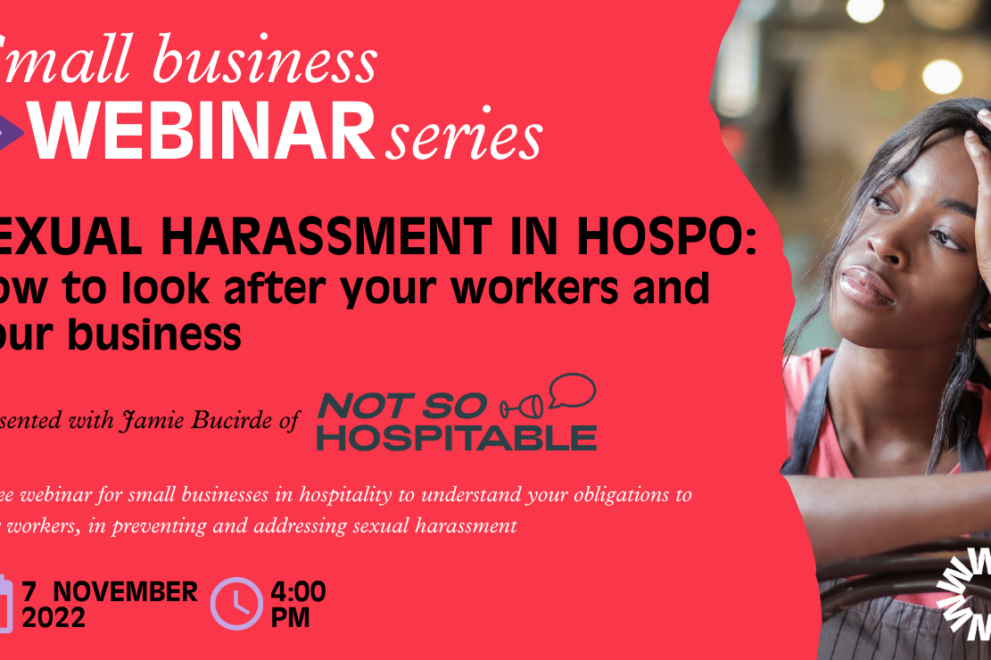
This webinar was presented as part of our 2022 Small Business Webinar Series.
Our Small Business Webinar series was designed around common issues identified by our lawyers in 2022, as a series of bite-sized, easy-to-understand educational sessions to help busy small businesses understand their obligations to their workers.
This webinar is designed to be an end-of-year “check-up” for your business – an opportunity to reflect, and to give you tips to make sure your workplace is a safe, healthy and compliant leading into 2023.
We look at the latest developments in employment law, and how to how to handle situations such as workplace bullying, disciplinary matters, and dismissals in a way which is fair and transparent.
This webinar was the fourth and final in the Series, and was presented on 8 December 2022. Information was current as of that date. Due to technical issues, it was re-recorded.
Please note that this is general information and may not be relevant to your particular matter. This should not be taken as legal advice.
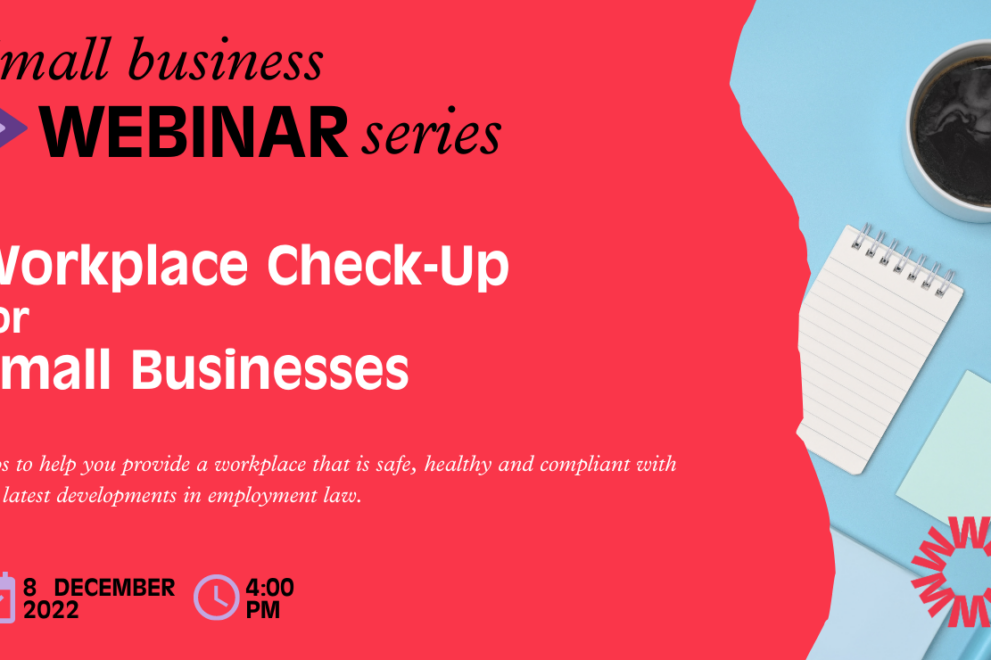
This webinar was presented as part of our 2022 Small Business Webinar Series.
Our Small Business Webinar series was designed around common issues identified by our lawyers in 2022, as a series of bite-sized, easy-to-understand educational sessions to help busy small businesses understand their obligations to their workers.
In this webinar, we look at the latest developments in employment law in the NDIS sector. This Workplace Check-Up session is an opportunity to take stock of your workplace, and to give you tips to make sure your workplace is safe, healthy and an environment in which your employees can thrive.
We look at common issues in the Social, Community, Home Care and Disability Services Industry Award 2010 and and how to how to handle situations such as workplace bullying, disciplinary matters, and dismissals in a way which is fair and transparent.
This webinar was the second in the Series, and was presented on 16 November 2022. Information was current as of that date.
Please note that this is general information and may not be relevant to your particular matter. This should not be taken as legal advice.
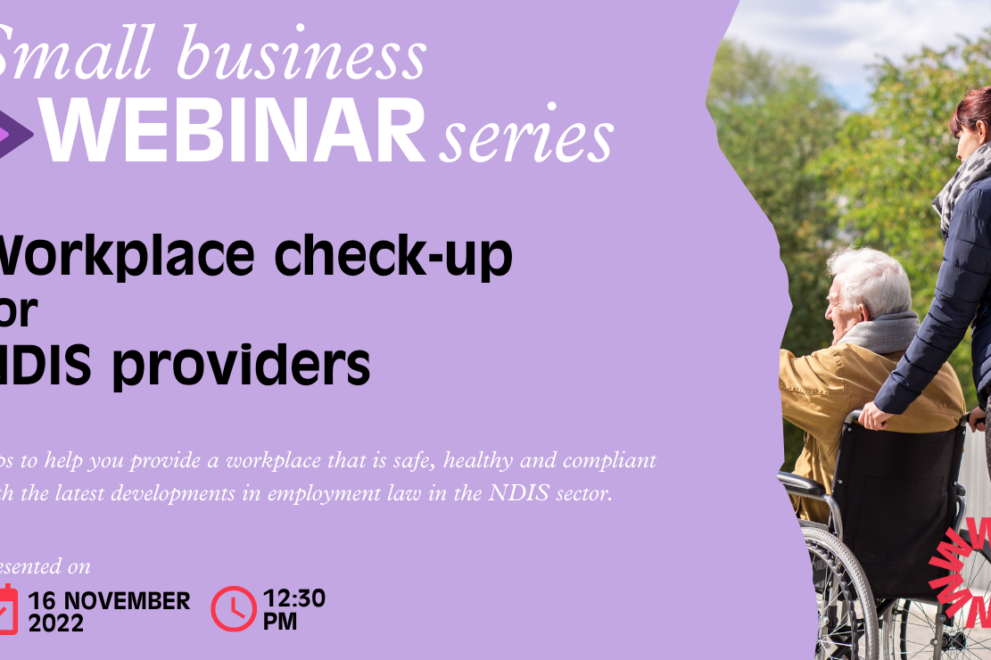
This webinar was presented as part of our 2022 Small Business Webinar Series.
Our Small Business Webinar series was designed around common issues identified by our lawyers in 2022, as a series of bite-sized, easy-to-understand educational sessions to help busy small businesses understand their obligations to their workers.
Have you heard about the Federal Government’s changes to domestic and violence leave?
Do you know what your obligations will be as a small business?
Do you know how to handle a disclosure of domestic violence from one of your staff?
This webinar provides you with information about the changes to legislation, your obligations, and how to manage disclosures of domestic and family violence and best support your employees.
This webinar was the third in the Series, and was presented on 1 December 2022. Information was current as of that date.
Please note that this is general information and may not be relevant to your particular matter. This should not be taken as legal advice.
This material is designed and intended to provide general information in summary form on legal topics, current at the time of publication, for general informational purposes only. This is not legal advice.
This webinar was presented by Nikki Candy, Lawyer at the Working Women’s Centre, and Commissioner Platt and Commissioner Hampton of the Fair Work Commission.
The Fair Work Commission (the Commission) is Australia’s workplace tribunal established under the Fair Work Act 2009 (Cth). The Commission comprises of Members (who conduct proceedings and make decisions) and staff (who assist the public, parties and provide services to the Members). They are based in each State and Territory. The Commission currently has three Members in South Australia.
The Commission deals with approximately 30,000 applications and 13,000 hearings and conferences per year. The great majority of these cases involve unrepresented parties, so the information, systems and processes of the Fair Work Commission are designed to be accessed by self-represented parties.
The Commissioners’ role is to conduct the conference or hearing regarding your matter.
Commissioners Platt and Hampton kindly agreed to share their Top 10 Tips on Self-Representing in the Fair Work Commission.
There are different options for filing a claim. Think about what outcomes do you want to achieve, and does the form of application enable that? For instance – consider whether you are eligible to apply for the kind of application you are considering.
The most common matters are:
Unfair dismissal claims – these claims consider whether your dismissal was harsh, unjust or unfair. You need to meet certain criteria to lodge – such as your length of service and type or pattern of employment.
General protections claims are about the reason why you are dismissed – for example, if you were dismissed for raising a workplace right, or because you were discriminated against.
[remember that there are only 21 days from the date of dismissal to file either claim involving dismissal – read our fact sheet on unfair dismissals here]
Secondly, consider what kind of outcome you are after. For example, monetary outcomes from general protections are higher but it is a long process to see this through to Court. Unfair dismissals have different limits on available compensation but generally are a more informal process. Consider how much time you want to invest in pursuing an outcome. Read some material, and get some advice.
Here are some common terms with which you should familiarise yourself.
Applicant – Who made the complaint (or started the proceeding) – This is normally you.
Respondent – Who the complaint is against – This is normally the employer
Commission Member – The independent Commissioner or Deputy President of the Fair Work Commission who will conduct the conference or hearing. Call them ‘Commissioner’ or ‘Deputy President’ unless they suggest otherwise.
Conciliator – There are two types of conciliators. Normally the first conciliation will be conducted by a staff member of the Commission, who often have legal training. Second conciliations (which are done if the first conciliation has failed, or if there is another reason such as a jurisdictional objection) may be conciliated by Member of the Commission. This is called a Member Assisted Conciliation.
Conciliation conference – Conciliations are an ‘off the record’ discussion where the Commission member normally tries to identify strengths and weakness of each party’s case, and considers what remedies might be awarded and then facilitates a discussion to try and get the parties to agree a basis to settle their differences without the time, cost and delay of a hearing.
Conciliations can be conducted on the phone or a Video Conference, and sometimes in person. No records are kept if the matter does not resolve. If a settlement is agreed it will normally be documented and/or recorded.
About 80% of cases settle by the end of conciliation.
Directions Hearing – This is normally conducted on the telephone and usually occurs after conciliation has failed. The purpose of the Directions Hearing is for the Commission Member to determine the date, length (based on number of witnesses) and mode of Hearing (phone, video conference or in person) and deadlines for you to lodge your material. Make sure you bring your diary with you.
This is also an opportunity for you to ask questions about the process or ask for a second Conciliation if you still think the matter could be resolved.
Directions – Directions are the instructions from the Commission Member. They are normally sent to you in writing by email. They set out important timelines and instructions for your matter. Read them carefully and make sure you comply, or you may be disadvantaged.
The Directions normally contain links to information sources that will assist you understand and/or prepare your case.
Member’s Associate – Each Member of the Commission has an assistant called a Member’s Associate. You can ring the Member’s Associate if you have questions; they regularly deal with questions from unrepresented parties, but cannot provide you with legal advice.
Conciliation is the opportunity for parties to resolve the matter. It is usually the first stage in most cases (although jurisdictional objections may be heard first in some cases).
Resolutions: By default, the agreement you reach in a conciliation is immediately a legally binding and enforceable contract.
The Commission Member has to determine what happened. They do that by looking at the evidence presented by both parties.
Evidence = You will be asked to present your evidence in a Statement of Evidence. This is a summary of the evidence that you, and anyone else that you bring, will give in support of your case.
Submissions – this is where you apply the law to your facts and say why you have been treated unfairly.
For further information on conciliations, read our Conciliation Conference Information fact sheet.
This material is designed and intended to provide general information in summary form on legal topics, current at the time of publication, for general informational purposes only. This is not legal advice.
Can you really report instances of sexual harassment in your workplace when you risk losing your job? How does job security help to protect workers from sexual harassment and gendered violence?
Listen to: The Protective Power of Job Security. Our guest speakers will discuss how violence against women is linked to casualisation and how we can prevent violence by increasing access to job security.
Senator Sarah Hanson-Young: Senator for South Australia.
Tanya Hosch: 2021 South Australian of the Year, and the Executive General Manager of Inclusion and Social Policy at the AFL.
Gemma Beale: Writer and a PhD Candidate at Flinders University, with a focus on insecure work and a passion for economic justice.
This event is possible due to a grant from the Government of South Australia, Department of Human Services, as part of the COVID-19 National Partnership – Domestic Violence Funding.
We acknowledge that this event will be held on Kaurna land and we pay our respect to the traditional custodians of the land, past and present. Sovereignty was never ceded.
CONTENT NOTE: this event will involve a discussion on sexual harassment, domestic and family violence and sexual assault.
The Respect@Work Report (2020) outlines that 1 in 3 Australians have experienced sexual harassment at work, ranging from serious offences like sexual assault and rape to inappropriate comments and sexist slurs.
At the Working Women’s Centre, our staff regularly provide advice and support for workers who have experienced workplace sexual harassment. Many of these workers are working in insecure jobs, such as casual or fixed-term contracts.
Our staff have observed that workers are often unable to resist or report sexual harassment due to the risk of losing their job. Gender inequality is proven to be the most significant driver of violence against women and workplace sexual harassment. We have the opportunity to prevent violence by collectively working to increase access to job security.
The Working Women’s Centre is proud to hold a panel event about job insecurity and its connection with gendered violence. In this event, we will hear from three fantastic speakers, each sharing their personal experience and expertise on the topic. The event is also the launch of a new project to improve job security as a protective factor against violence.
This material is designed and intended to provide general information in summary form on legal topics, current at the time of publication, for general informational purposes only. This is not legal advice.
In the first 12 years of their child’s life, most women’s careers, finances and ability to participate in the workplace is seriously undermined by the rolling inequities in law and public policy about parenting and family.
The Working Women’s Centre SA invites Professor Rae Cooper and Associate Professor Elizabeth Hill, two pre-eminent experts in the world of women, family, and work, to discuss how public policy and legislation effects women, work, and families.
We are going to examine these public policies and laws and ask the following questions:
This material is designed and intended to provide general information in summary form on legal topics, current at the time of publication, for general informational purposes only. This is not legal advice.
Created and hosted in partnership with Hen House Co-op based in South Australia, we are proud to present this webinar that has been designed to help women running their own small businesses feel confident in employing others fairly and legally.
This webinar will cover:
– Types of workers and employment
– Fair pay and entitlements;
– Where to find pay rates
– Superannuation – How much and when?
– Record keeping and pay slips
– Fair disciplinary process
– National Employment Standards
– Ending employment
This material is designed and intended to provide general information in summary form on legal topics, current at the time of publication, for general informational purposes only. This is not legal advice.
Have you experienced discrimination based on your gender or sexuality? Have you had trouble accessing Centrelink? Would you like to be more aware of your rights?
This webinar will help you learn about your LGBTQI+ legal rights and protections.
This webinar was created by the Working Women’s Centre South Australia, Westside Lawyers and UC Law Centre, and covers welfare rights, Centrelink issues and workplace rights with a focus on discrimination. This webinar was originally streamed as part of Adelaide’s Feast Festival in 2021.
We acknowledge that this event was streamed on Kaurna land and we pay our respect to the traditional custodians of the land, past and present. Sovereignty was never ceded.
This material is designed and intended to provide general information in summary form on legal topics, current at the time of publication, for general informational purposes only. This is not legal advice.
In this webinar Industrial Officer Lungaka Mbedla from the Working Women’s Centre SA Inc presents an overview of the common workplace issues in the hospitality industry in South Australia. Presented with the South Australian Restaurant and Catering Association with:
This material is designed and intended to provide general information in summary form on legal topics, current at the time of publication, for general informational purposes only. This is not legal advice.
The Workplace Check-Up webinar aims to give you the tools to make sure your workplace is safe, healthy and an environment in which your employees can thrive. The workshop will cover:
This event was originally presented Thursday 24th June 2021, in partnership with SACOSS
This material is designed and intended to provide general information in summary form on legal topics, current at the time of publication, for general informational purposes only. This is not legal advice.
There have been many claims that Working from Home (WFH) will spearhead a feminist revolution, likening the change in our work environment to the structural changes we saw for working women during and after WW1.
These sorts of claims elicit many questions;
There are no simple answers, and as always it depends; not every person has the opportunity to WFH or experiences WFH equally. Can we re-imagine work, so that is works for us?
To keep this conversation going and maybe answer some of these questions, the Working Women’s Centre SA Inc is proud to host:
Working from Home: Risks and Rewards: An online panel conversation about gender and labour, while working from & in the home.
PANELLISTS:
The Working Women’s Centre has teamed up with National Union of Students Welfare Department, (FUSA Flinders University Student Association, USASA UniSA Student Association, Adelaide University Student Representative Council, Adelaide Young Christian Workers – YCW & The Young Workers Legal Service to present:
Your Rights at Work – Free webinar training for International Students in Australia
This free webinar is designed for international students studying in Australia, providing them with skills and resources to better equip them to assert their rights in the workplace and to fight exploitation.
We recognise that many international students are working casually, often well below the minimum wage and can be at greater risk of exploitation by their employer.
We also know that as the South Australian economy opens up, there will be greater competition for jobs and employers trying to cut corners.
Our team of experts will leave you with a better understanding of the Australian workplace laws and some ideas about how to address unfair treatment in your own workplace.
This material is designed and intended to provide general information in summary form on legal topics, current at the time of publication, for general informational purposes only. This is not legal advice.
Wage Theft in South Australia is an epidemic. The McKell Institute estimates that wage theft is costing South Australian workers $500 million a year.
The Working Women’s Centre SA recovered over $500,000 for workers in just one financial year. While this is a great achievement, it is only a fraction of what is owed to hard working South Australians. We know, more than most, that wage theft is hitting women and migrant workers the hardest.
Wage theft extends to the non-payment of base wages, penalty rates, superannuation, loadings, and the non-payment of entitlements that workers should be receiving by law. In some sectors of the economy, wage theft has transitioned from a fringe activity to a business model.
This is an issue for workers and the government. In fact, the South Australian Parliamentary Wage Theft Interim Report confirms what we already knew: wage theft is rife in South Australia and it affects the most vulnerable workers in our community.
We gave evidence to the Wage Theft Inquiry about one of our clients who was only paid $14 an hour. How can you live on $14 an hour? You can’t. It isn’t a living wage.
In response to the Interim Report, we are holding a community discussion about the prevalence of wage theft to kick start South Australia’s response to this issue.
There are big questions at hand:
• Should we follow Victoria’s lead and criminalise wage theft?
• Is our industrial system is too complex?
• How does wage theft impact on working women? And is this impact due to a common business model?
• What are trade unions doing about this issue? And how do we campaign for a living wage?
We are thrilled to host Irene Pnevmatikos MLC, Edward Cavanough from the McKell Institute and Angas Story from SA Unions to tackle those issues and more.
We acknowledge that this event will streamed from Kaurna land and we pay our respect to the traditional custodians of the land past, present, and emerging. Sovereignty was never ceded
This material is designed and intended to provide general information in summary form on legal topics, current at the time of publication, for general informational purposes only. This is not legal advice.
The impact of COVID19 on young women has been devastating.
When it comes to getting work, young women are in a worse position than any other age and gender demographic. So it’s important to question: are our needs reflected in COVID recovery policies? In this seminar, we will discuss the impacts of COVID19 on young women, what needs to happen to stop us from being left behind, and how to turn our anger into action. Several powerful young women will join us to share their thoughts and experiences.
Speakers:
There will be an Q&A session and opportunities to provide your input into the discussion. We acknowledge that this event will stream from Kaurna land and we pay our respect to the traditional custodians of the land, past, present and emerging. Sovereignty was never ceded.
This webinar is part of the Working Women’s Centre youth project that is funded by the Government of South Australia – Department of Human Resources.
This material is designed and intended to provide general information in summary form on legal topics, current at the time of publication, for general informational purposes only. This is not legal advice.
October is sexual violence awareness month, and Reclaim the Night is a march that is traditionally held on the last Friday of October, to reclaim the streets so that women can walk at night without fear. This October, we gathered online to talk about reclaiming the workplace by ending sexual violence and harassment. We were joined by a panel of expert speakers to discuss what sexual harassment looks like, the extent of the problem in Australia, and what we can do to end sexual violence and harassment in our places of work and study.
Speakers:
Artwork by Cath Story. Find her art on Instagram @cathstorydraws
This webinar was streamed on Kaurna land. We pay our respect to the traditional custodians of the land, past, present and emerging. Sovereignty was never ceded.